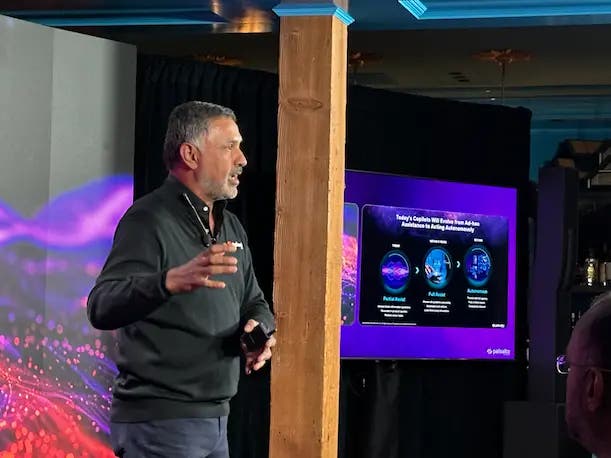As Companies Flood Into Security AI, Do Large Players Have A Data Advantage?
by nlqip

Executives from major cybersecurity vendors such as Palo Alto Networks and Proofpoint see the arrival of GenAI as a different story from prior technology shifts — with the need for having massive customer data being paramount.
The history of technology shifts in recent decades has tended to center around scrappy upstarts, which burst onto the scene with a big new idea and disrupt more-established players. Generative AI may play out differently, however.
While the initiation of the GenAI revolution by OpenAI certainly fits the classic mold of a startup-led disruption, executives from major cybersecurity vendors suggest that large companies will have a leg-up when it comes to actually utilizing generative AI to drive new technologies.
In debuting Palo Alto Networks’ new suite of AI-powered offerings in May, for instance, CEO Nikesh Arora touted the company’s massive storehouse of real-world customer data that the cybersecurity giant is using to train its AI models.
“For the first time in the history of technology, we are in a situation where we have the advantage [as] incumbents,” Arora (pictured) said during the event in San Francisco to debut the company’s new Precision AI capabilities.
[Related: AI Week 2024]
Speaking with CRN Palo Alto Networks Chief Product Officer Lee Klarich noted that AI of all varieties “feeds on data.”
“And so, if you’re in a position to have a greater amount of data, that’s [an advantage],” Klarich said.
Proofpoint CEO Sumit Dhawan said this certainly doesn’t mean that larger vendors can be complacent. But it does mean that startups have different hurdles to overcome in order to disrupt the industry using GenAI, as compared to prior technology shifts.
“You’re not going to train your model with public data. It’s useless. You can only use your customers’ data to train,” Dhawan told CRN. “And if you don’t acquire customers, how are you going to train the model?”
Bipul Sinha, co-founder and CEO of Rubrik, noted that the arrival of the internet and other prior technology shifts actually amounted to changes in distribution, which allowed small startups to reach customers more easily. The internet provided a new distribution model and many startups were able to move more quickly to utilize the new model than large companies.
However, “this platform switch, in AI, is a productivity switch,” Sinha said in an interview. “And when you think about a productivity switch, obviously it favors larger organizations, because they have a lot more angles to optimize on the productivity — because of the number of services that they’re delivering to their customers.”
Ultimately, “without data and security of data, GenAI is meaningless,” he said.
Other factors loom large as well. Access to data scientists is also crucial for making headway with AI, and such specialists are in high demand and hard to come by, said Bill Young, managing partner at Optiv, No. 25 on CRN’s Solution Provider 500 for 2024.
“There just aren’t enough people in the space right now,” Young said. “We’re rushing into this space so fast. And what you’re seeing is, the bigger players have more access to the armies of resources needed to be able to explore [the technologies].”
While many startups will no doubt be successful with launching GenAI-powered innovations, this technology shift “isn’t just, ‘Hey, I have a new idea, let me go in my basement and slap something together.’ That’s not feasible here,” he said. “You’re talking about putting together a lot of complex information.”
The need for relevant data is particularly acute when it comes to cybersecurity. The protection that a security tool can provide is only as going to be as robust as the underlying datasets used to train the AI models, said Patrick Harr, CEO of AI-powered email security vendor SlashNext.
“If you are making a decision on an inaccurate data set—and/or you don’t have enough data to make that decision on—then you aren’t going to be as protective of your customers. You are leaving those customers susceptible,” Harr said. “You’re only as good as your data.”
Source link
lol
Executives from major cybersecurity vendors such as Palo Alto Networks and Proofpoint see the arrival of GenAI as a different story from prior technology shifts — with the need for having massive customer data being paramount. The history of technology shifts in recent decades has tended to center around scrappy upstarts, which burst onto the…
Recent Posts
- Arm To Seek Retrial In Qualcomm Case After Mixed Verdict
- Jury Sides With Qualcomm Over Arm In Case Related To Snapdragon X PC Chips
- Equinix Makes Dell AI Factory With Nvidia Available Through Partners
- AMD’s EPYC CPU Boss Seeks To Push Into SMB, Midmarket With Partners
- Fortinet Releases Security Updates for FortiManager | CISA
